은근슬적 포인트컷 지시 문법들 그냥 넘어갔었는데 이번에 다룬다.
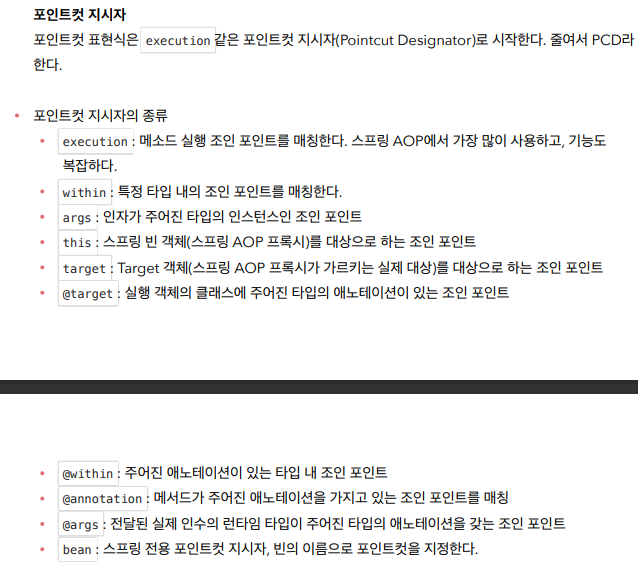
execution을 가장 많이 사용하고 나머지는 자주 사용하지는 않아 execution 위주로 볼거다.
기반 및 테스트코드 작성
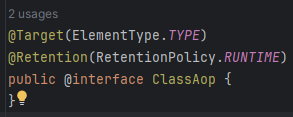
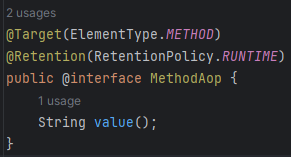
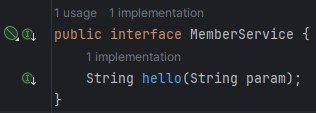
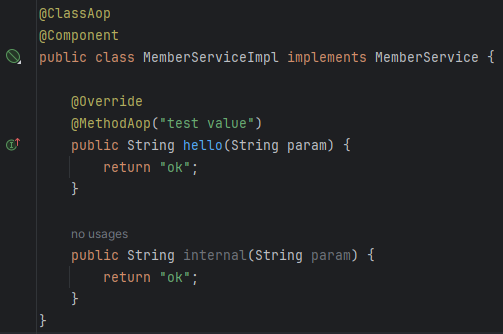
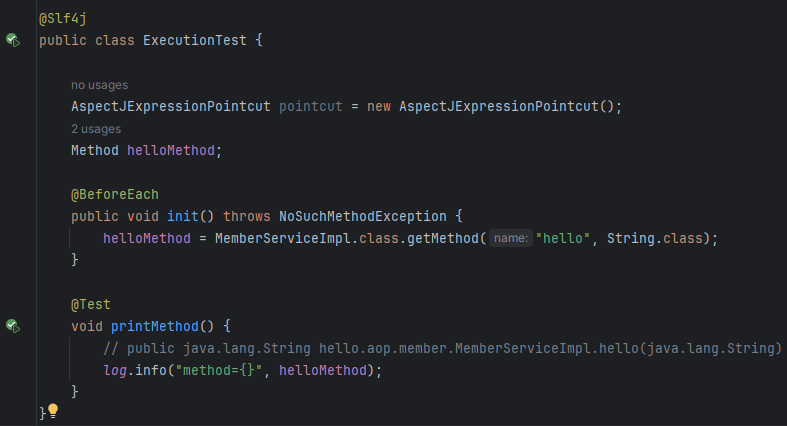

MemberService 클래스 인스턴스를 만들어 거기에 hello라는 함수를 가져온 모습이다.
이걸 기반으로 포인트컷 문법들을 본다.
@Slf4j
public class ExecutionTest {
AspectJExpressionPointcut pointcut = new AspectJExpressionPointcut();
Method helloMethod;
@BeforeEach
public void init() throws NoSuchMethodException {
helloMethod = MemberServiceImpl.class.getMethod("hello", String.class);
}
@Test
void printMethod() {
// public java.lang.String hello.aop.member.MemberServiceImpl.hello(java.lang.String)
log.info("method={}", helloMethod);
}
@Test
void exactMatch() {
pointcut.setExpression("execution(public String hello.aop.member.MemberServiceImpl.hello(java.lang.String))");
assertThat(pointcut.matches(helloMethod, MemberServiceImpl.class)).isTrue();
}
@Test
void allMatch() {
pointcut.setExpression("execution(* *(..))");
assertThat(pointcut.matches(helloMethod, MemberServiceImpl.class)).isTrue();
}
@Test
void nameMatch() {
pointcut.setExpression("execution(* hello(..))");
assertThat(pointcut.matches(helloMethod, MemberServiceImpl.class)).isTrue();
}
@Test
void nameMatchStar1() {
pointcut.setExpression("execution(* hel*(..))");
assertThat(pointcut.matches(helloMethod, MemberServiceImpl.class)).isTrue();
}
@Test
void nameMatchStar2() {
pointcut.setExpression("execution(* *el*(..))");
assertThat(pointcut.matches(helloMethod, MemberServiceImpl.class)).isTrue();
}
@Test
void nameMatchFalse() {
pointcut.setExpression("execution(* nono(..))");
assertThat(pointcut.matches(helloMethod, MemberServiceImpl.class)).isFalse();
}
@Test
void packageExactMatch1() {
pointcut.setExpression("execution(* hello.aop.member.MemberServiceImpl.hello(..))");
assertThat(pointcut.matches(helloMethod, MemberServiceImpl.class)).isTrue();
}
@Test
void packageExactMatch2() {
pointcut.setExpression("execution(* hello.aop.member.*.*(..))");
assertThat(pointcut.matches(helloMethod, MemberServiceImpl.class)).isTrue();
}
@Test
void packageExactMatchFalse() {
pointcut.setExpression("execution(* hello.aop.*.*(..))");
assertThat(pointcut.matches(helloMethod, MemberServiceImpl.class)).isFalse();
}
@Test
void packageMatchSubPackage1() {
pointcut.setExpression("execution(* hello.aop.member..*.*(..))");
assertThat(pointcut.matches(helloMethod, MemberServiceImpl.class)).isTrue();
}
@Test
void packageMatchSubPackage2() {
pointcut.setExpression("execution(* hello.aop..*.*(..))");
assertThat(pointcut.matches(helloMethod, MemberServiceImpl.class)).isTrue();
}
}




타입(인터페이스 부모관계)
@Test
void typeExactMatch() {
pointcut.setExpression("execution(* hello.aop.member.MemberServiceImpl.*(..))");
assertThat(pointcut.matches(helloMethod, MemberServiceImpl.class)).isTrue();
}
@Test
void typeMatchSuperType() {
pointcut.setExpression("execution(* hello.aop.member.MemberService.*(..))");
assertThat(pointcut.matches(helloMethod, MemberServiceImpl.class)).isTrue();
}
@Test
void typeMatchInternal() throws NoSuchMethodException {
pointcut.setExpression("execution(* hello.aop.member.MemberServiceImpl.*(..))");
Method internalMethod = MemberServiceImpl.class.getMethod("internal", String.class);
assertThat(pointcut.matches(internalMethod, MemberServiceImpl.class)).isTrue();
}
@Test
void typeMatchNoSuperTypeMethodFalse() throws NoSuchMethodException {
pointcut.setExpression("execution(* hello.aop.member.MemberService.*(..))");
Method internalMethod = MemberServiceImpl.class.getMethod("internal", String.class);
assertThat(pointcut.matches(internalMethod, MemberServiceImpl.class)).isFalse();
}
메서드
// String 타입의 파라미터 허용
// String
@Test
void argsMatch() {
pointcut.setExpression("execution(* *(String))");
assertThat(pointcut.matches(helloMethod, MemberServiceImpl.class)).isTrue();
}
// 파라미터가 없어야 함
// ()
@Test
void argsMatchNoArgs() {
pointcut.setExpression("execution(* *())");
assertThat(pointcut.matches(helloMethod, MemberServiceImpl.class)).isFalse();
}
// 정확히 하나의 파라미터 허용, 모든 타입 허용
// (Xxx)
@Test
void argsMatchStar() {
pointcut.setExpression("execution(* *(*))");
assertThat(pointcut.matches(helloMethod, MemberServiceImpl.class)).isTrue();
}
// 숫자와 무관하게 모든 파라미터, 모든 타입 허용
// (), (Xxx), (Xxx, Xxx)
@Test
void argsMatchAll() {
pointcut.setExpression("execution(* *(..))");
assertThat(pointcut.matches(helloMethod, MemberServiceImpl.class)).isTrue();
}
// String 타입으로 시작, 숫자와 무관하게 모든 파라미터, 모든 타입 허용
// (String), (String, Xxx), (String, Xxx, Xxx)
@Test
void argsMatchComplex() {
pointcut.setExpression("execution(* *(String, ..))");
assertThat(pointcut.matches(helloMethod, MemberServiceImpl.class)).isTrue();
}
이제 execution외에 따른 문법들 볼건데, 웬만하면 execution만 쓰니까 참고정도로만 알아두자.
within은 모든 메서드 허용
public class WithinTest {
AspectJExpressionPointcut pointcut = new AspectJExpressionPointcut();
Method helloMethod;
@BeforeEach
public void init() throws NoSuchMethodException {
helloMethod = MemberServiceImpl.class.getMethod("hello", String.class);
}
@Test
void withinExact() {
pointcut.setExpression("within(hello.aop.member.MemberServiceImpl)");
assertThat(pointcut.matches(helloMethod,
MemberServiceImpl.class)).isTrue();
}
@Test
void withinStar() {
pointcut.setExpression("within(hello.aop.member.*Service*)");
assertThat(pointcut.matches(helloMethod,
MemberServiceImpl.class)).isTrue();
}
@Test
void withinSubPackage() {
pointcut.setExpression("within(hello.aop..*)");
assertThat(pointcut.matches(helloMethod,
MemberServiceImpl.class)).isTrue();
}
@Test
@DisplayName("타켓의 타입에만 직접 적용, 인터페이스를 선정하면 안된다.")
void withinSuperTypeFalse() {
pointcut.setExpression("within(hello.aop.member.MemberService)");
assertThat(pointcut.matches(helloMethod,
MemberServiceImpl.class)).isFalse();
}
@Test
@DisplayName("execution은 타입 기반, 인터페이스를 선정하면 안된다.")
void executionSuperTypeTrue() {
pointcut.setExpression("execution(* hello.aop.member.MemberService.*(..))");
assertThat(pointcut.matches(helloMethod,
MemberServiceImpl.class)).isTrue();
}
}
args는 부모타입 허용
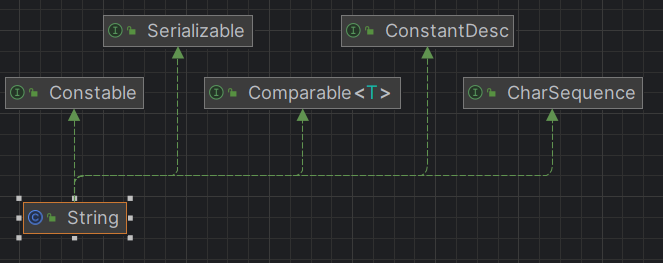
public class ArgsTest {
Method helloMethod;
@BeforeEach
public void init() throws NoSuchMethodException {
helloMethod = MemberServiceImpl.class.getMethod("hello", String.class);
}
private AspectJExpressionPointcut pointcut(String expression) {
AspectJExpressionPointcut pointcut = new AspectJExpressionPointcut();
pointcut.setExpression(expression);
return pointcut;
}
@Test
void args() {
//hello(String)과 매칭
assertThat(pointcut("args(String)")
.matches(helloMethod, MemberServiceImpl.class)).isTrue();
assertThat(pointcut("args(Object)")
.matches(helloMethod, MemberServiceImpl.class)).isTrue();
assertThat(pointcut("args()")
.matches(helloMethod, MemberServiceImpl.class)).isFalse();
assertThat(pointcut("args(..)")
.matches(helloMethod, MemberServiceImpl.class)).isTrue();
assertThat(pointcut("args(*)")
.matches(helloMethod, MemberServiceImpl.class)).isTrue();
assertThat(pointcut("args(String,..)")
.matches(helloMethod, MemberServiceImpl.class)).isTrue();
}
/**
* execution(* *(java.io.Serializable)): 메서드의 시그니처로 판단 (정적)
* args(java.io.Serializable): 런타임에 전달된 인수로 판단 (동적)
*/
@Test
void argsVsExecution() {
//Args
assertThat(pointcut("args(String)")
.matches(helloMethod, MemberServiceImpl.class)).isTrue();
assertThat(pointcut("args(java.io.Serializable)")
.matches(helloMethod, MemberServiceImpl.class)).isTrue();
assertThat(pointcut("args(Object)")
.matches(helloMethod, MemberServiceImpl.class)).isTrue();
//Execution
assertThat(pointcut("execution(* *(String))")
.matches(helloMethod, MemberServiceImpl.class)).isTrue();
assertThat(pointcut("execution(* *(java.io.Serializable))") //매칭 실패
.matches(helloMethod, MemberServiceImpl.class)).isFalse();
assertThat(pointcut("execution(* *(Object))") //매칭 실패
.matches(helloMethod, MemberServiceImpl.class)).isFalse();
}
}
@target과 @within
@Slf4j
@Import({AtTargetAtWithinTest.Config.class})
@SpringBootTest
public class AtTargetAtWithinTest {
@Autowired
Child child;
@Test
void success() {
log.info("child Proxy={}", child.getClass());
child.childMethod(); //부모, 자식 모두 있는 메서드
child.parentMethod(); //부모 클래스만 있는 메서드
}
static class Config {
@Bean
public Parent parent() {
return new Parent();
}
@Bean
public Child child() {
return new Child();
}
@Bean
public AtTargetAtWithinAspect atTargetAtWithinAspect() {
return new AtTargetAtWithinAspect();
}
}
static class Parent {
public void parentMethod() {
} //부모에만 있는 메서드
}
@ClassAop
static class Child extends Parent {
public void childMethod() {
}
}
@Slf4j
@Aspect
static class AtTargetAtWithinAspect {
//@target: 인스턴스 기준으로 모든 메서드의 조인 포인트를 선정, 부모 타입의 메서드도 적용
@Around("execution(* hello.aop..*(..)) && @target(hello.aop.member.annotation.ClassAop)")
public Object atTarget(ProceedingJoinPoint joinPoint) throws Throwable {
log.info("[@target] {}", joinPoint.getSignature());
return joinPoint.proceed();
}
//@within: 선택된 클래스 내부에 있는 메서드만 조인 포인트로 선정, 부모 타입의 메서드는 적용되지 않음
@Around("execution(* hello.aop..*(..)) && @within(hello.aop.member.annotation.ClassAop)")
public Object atWithin(ProceedingJoinPoint joinPoint) throws Throwable {
log.info("[@within] {}", joinPoint.getSignature());
return joinPoint.proceed();
}
}
}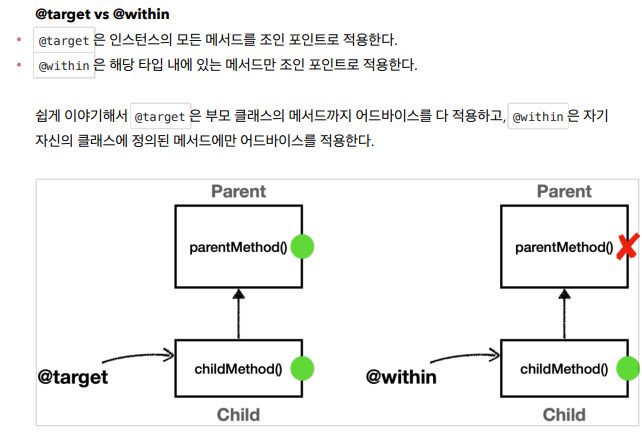

주의할점은 args, @args, @target은 프록시가 있어야 하므로 런타임 시점에서 작동한다. 그래서 AOP가 있어야 사용 가능하므로 빈에 등록되어 있는 모든 빈들을 AOP로 바꾸려고 한다. 그래서 final로 못바꾸는 빈들이 있어서 에러가 발생함. 그래서 프록시 적용 대상을 축소하는 표현식과 함께 사용해야 한다.
@annotation과 @args
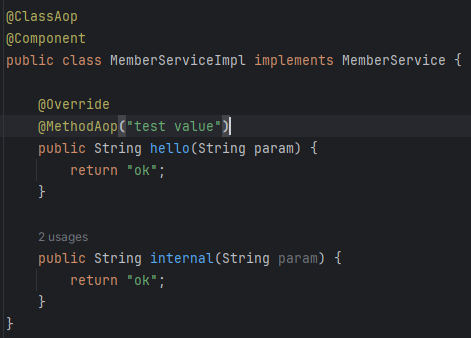


어노테이션이라서 가끔 쓰인다.

다음은 bean
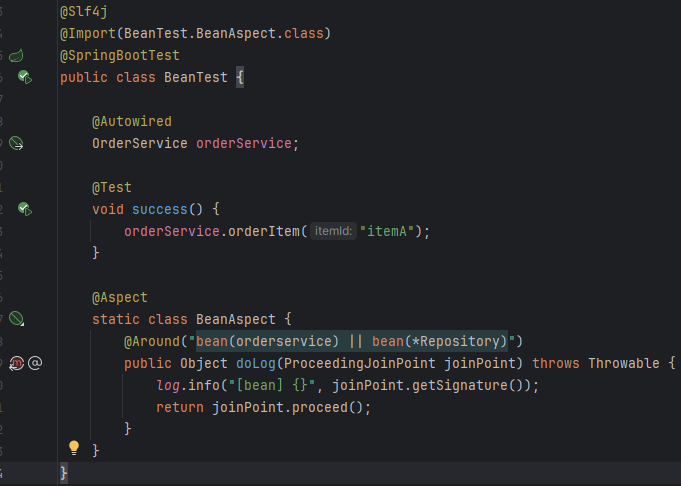

등록되는 이름이 확정적일 때 쓸 수 있다.
다음은 this, target, args, @target, @within, @annotation, @args

매개변수 이름이 똑같으면 그대로 가져다 쓸 수 있다.
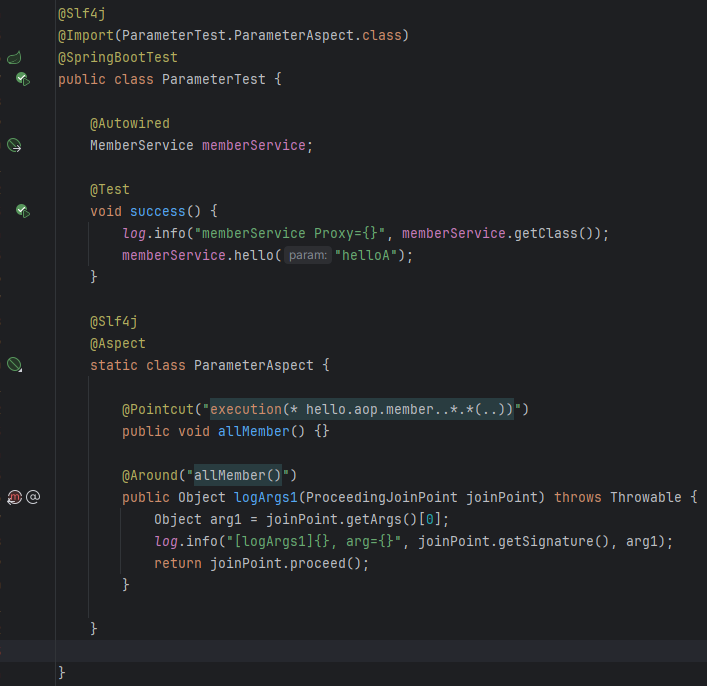

그냥 joinPoint에서 매개변수 가져올 때. 배열로써 가져오는게 직관적이지 않아 더 나은 방법이 args다.
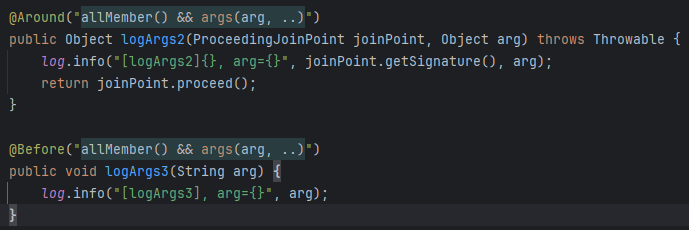
this랑 target


어노테이션도 쓸 수 있고, 메소드 쓰면 안의 매개변수까지 가져오고... 그냥 그렇다. this는 프록시 객체를, target은 프록시로 감싸진 그 클래스 자체를 전달받음.
this와 target의 차이.


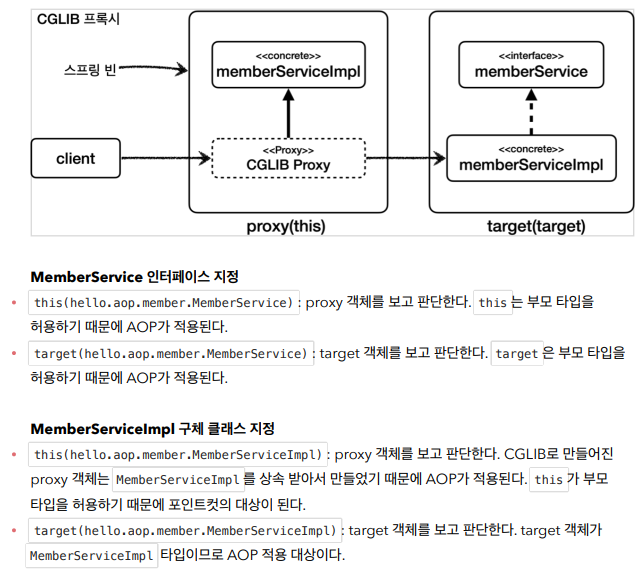

/**
* application.properties
* spring.aop.proxy-target-class=true CGLIB (default)
* spring.aop.proxy-target-class=false JDK Dynamic Proxy
*/
@Slf4j
@Import(ThisTargetTest.ThisTargetAspect.class)
@SpringBootTest(properties = "spring.aop.proxy-target-class=false") // JDK Dynamic Proxy
public class ThisTargetTest {
@Autowired
MemberService memberService;
@Test
void success() {
log.info("memberService Proxy={}", memberService.getClass());
memberService.hello("helloA");
}
@Slf4j
@Aspect
static class ThisTargetAspect {
// 부모 타입 허용
@Around("this(hello.aop.member.MemberService)")
public Object doThisInterface(ProceedingJoinPoint joinPoint) throws Throwable {
log.info("[this-interface] {}", joinPoint.getSignature());
return joinPoint.proceed();
}
// 부모 타입 허용
@Around("target(hello.aop.member.MemberService)")
public Object doTargetInterface(ProceedingJoinPoint joinPoint) throws Throwable {
log.info("[target-interface] {}", joinPoint.getSignature());
return joinPoint.proceed();
}
@Around("this(hello.aop.member.MemberServiceImpl)")
public Object doThis(ProceedingJoinPoint joinPoint) throws Throwable {
log.info("[this-impl] {}", joinPoint.getSignature());
return joinPoint.proceed();
}
@Around("target(hello.aop.member.MemberServiceImpl)")
public Object doTarget(ProceedingJoinPoint joinPoint) throws Throwable {
log.info("[target-impl] {}", joinPoint.getSignature());
return joinPoint.proceed();
}
}
}
/**
* application.properties
* spring.aop.proxy-target-class=true CGLIB (default)
* spring.aop.proxy-target-class=false JDK Dynamic Proxy
*/
@Slf4j
@Import(ThisTargetTest.ThisTargetAspect.class)
@SpringBootTest(properties = "spring.aop.proxy-target-class=true") // JDK Dynamic Proxy
public class ThisTargetTest {
@Autowired
MemberService memberService;
@Test
void success() {
log.info("memberService Proxy={}", memberService.getClass());
memberService.hello("helloA");
}
@Slf4j
@Aspect
static class ThisTargetAspect {
// 부모 타입 허용
@Around("this(hello.aop.member.MemberService)")
public Object doThisInterface(ProceedingJoinPoint joinPoint) throws Throwable {
log.info("[this-interface] {}", joinPoint.getSignature());
return joinPoint.proceed();
}
// 부모 타입 허용
@Around("target(hello.aop.member.MemberService)")
public Object doTargetInterface(ProceedingJoinPoint joinPoint) throws Throwable {
log.info("[target-interface] {}", joinPoint.getSignature());
return joinPoint.proceed();
}
@Around("this(hello.aop.member.MemberServiceImpl)")
public Object doThis(ProceedingJoinPoint joinPoint) throws Throwable {
log.info("[this-impl] {}", joinPoint.getSignature());
return joinPoint.proceed();
}
@Around("target(hello.aop.member.MemberServiceImpl)")
public Object doTarget(ProceedingJoinPoint joinPoint) throws Throwable {
log.info("[target-impl] {}", joinPoint.getSignature());
return joinPoint.proceed();
}
}
}
'CS > 김영한 스프링 강의' 카테고리의 다른 글
| 스프링 핵심 원리 - 고급편 - 섹션13. 스프링 AOP - 실무 주의사항 (0) | 2023.12.23 |
|---|---|
| 스프링 핵심 원리 - 고급편 - 섹션12. 스프링 AOP - 실전 예제 (0) | 2023.12.20 |
| 스프링 핵심 원리 - 고급편 - 섹션9,10. 스프링 AOP 개념,구현 (0) | 2023.12.16 |
| 스프링 핵심 원리 - 고급편 - 섹션8. @Aspect AOP (0) | 2023.12.15 |
| 스프링 핵심 원리 - 고급편 - 섹션7. 빈 후처리기 (0) | 2023.12.15 |
